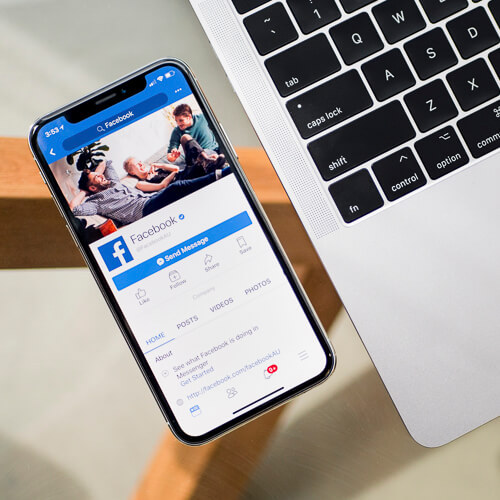Facebook's Q1 revenue soared 22% to $21.47 billion, 98.7% of it from advertisements, but the social media giant hopes AR will help eventually build some non-ad revenue, too.

Facebook's earnings, chiefly from ads, ballooned by 48% in the first quarter to $26.17 billion.
But the elephant in the room is the effect Apple's new data privacy policies will have on how Mark Zuckerberg's company can target ads in the future.
Bear in mind Facebook makes about 61% of its income on iPhones.
In the next three months, iOS's new privacy settings could knock $2.5 billion off Facebook's revenues, or 13.6%, according to Eric Seufert, a mobile advertising expert.
Figure 1:  Ads away: Can Facebook repeat impressive earnings next quarter as Apple give users the option to block ad tracking on the latest iOS?
Ads away: Can Facebook repeat impressive earnings next quarter as Apple give users the option to block ad tracking on the latest iOS?
(Source: Tim Bennett on Unsplash)
Right now, buoyed by a 30% year-on-year rise in the average price of an ad (top tip: this is largely due to targeting), Facebook's revenues are growing at their fastest clip since 2018. Last July this only scraped 10.7%.
Small and midsized businesses moving online because of coronavirus had an unexpected demand for targeted advertising (see that thing again), said Facebook's chief financial officer, Dave Wehner.
All this heady revenue growth will "significantly decelerate" in the second half of the year, he predicts.
Every breath you take
Facebook has a cunning plan to focus more on targeting ads with the user data it collects directly from the platform, claims its chief operating officer, Sheryl Sandberg.
"We're rebuilding meaningful elements of our ad tech so that our system continues to perform when we have access to less data in the future," she says.
Still, Facebook's keen to hedge its bets, by investing in augmented and virtual reality, and e-commerce. Long-term bets, but ones that might kick in down the road if ads start coming off the boil.
WhatsApp and Instagram, both of which Facebook has bought, both grew faster than the mothership.
Facebook proper saw 9% monthly user growth, down from 12% a year before.
Throw in other apps, though, and over 3.4 billion people now use a Facebook-owned app at least once a month. To give that some scale, the population of the world is 7.8 billion.
You better shop around
So Zuckerberg is setting out of a vision of Facebook and its extended family as an online sales platform megalith, where business can target ads, gain customers and process payments without ever leaving a tightly connected circle of Facebook, Messenger, WhatsApp Payments and Facebook Pay.
He is also possibly casting a covetous glance east to the highly integrated empire of China's Tencent, where Chinese users popping to the shops or paying for their parking never need to close WeChat in order to use, for instance, WeChat Pay.
.
Want to know more about cloud-native networks and NFV? Check out our dedicated cloud-native networks and NFV content channel here on Light Reading.
Instagram influencers, too, will find it easier to make money by promoting brands or selling their own wares. Again, borrowing a page from Chinese video apps-turned-mega-marketing-channels Kuaishou and Douyin.
And maybe then companies will move their budgets away from advertising and towards direct commerce, Zuckerberg mused wishfully to analysts in a conference call.
But for now, they run ads.
Google said a day previously it has enjoyed a similar uptick in its pandemic ad revenue.
Talk to the wall
Led by a strong performance from Silicon Valley, US corporate earnings, which were down 30% in the second quarter of 2020, are expected to be up 33%.
Things balance out. About 86% of US firms have beaten earnings expectations so far, observes South African trader Nick Kunze on Twitter.
Fang alert. About 86% of US firms have beaten earnings expectations In coming days, Facebook, Apple, Alphabet & Amazon will show how the tech heavyweights are faring. Apple earnings are seen up some 32%. Tesla reports on Tuesday and its revenues are forecast to have grown by 71%. pic.twitter.com/bq2vdvQNY2
�— Nick Kunze (@NickKunze2) April 25, 2021
One long-term bet Zuckerberg kept his mouth shut about was a highly anticipated reveal of big amounts of Bitcoin on the balance sheet.
Facebook has had less successful attempts to make its own cryptocurrency, with one digital currency called Libra (subsequently renamed Diem) tentatively mooted in 2019.
Board members Peter Thiel and Marc Andreesen are big Bitcoin buffs, and the price of Bitcoin soared shortly before the earnings announcement, before bashfully retreating.
All this empire-building isn't necessarily convincing the troops at 1 Hacker Way, Menlo Park.
The top employee voted question at today's internal Facebook Q&A for Mark Zuckerberg:
— Ryan Mac🙃 (@RMac18) April 22, 2021
"What is our next big product, which does not imitate already existing products on the market?"
The top employee-voted question for Zuckerberg at last week's internal Q&A was "What is our next big product, which does not imitate already existing products on the market?" says Ryan Mac.
Another was "Are you afraid of Facebook becoming like GE of the 1990s: a huge conglomerate where not all entities are tied to the company's core mission?"
Related posts:
— Pádraig Belton, contributing editor special to Light Reading
About the Author(s)
You May Also Like










